How Nutritional Deficiencies Can Lead to Tooth Sensitivity and Cavities
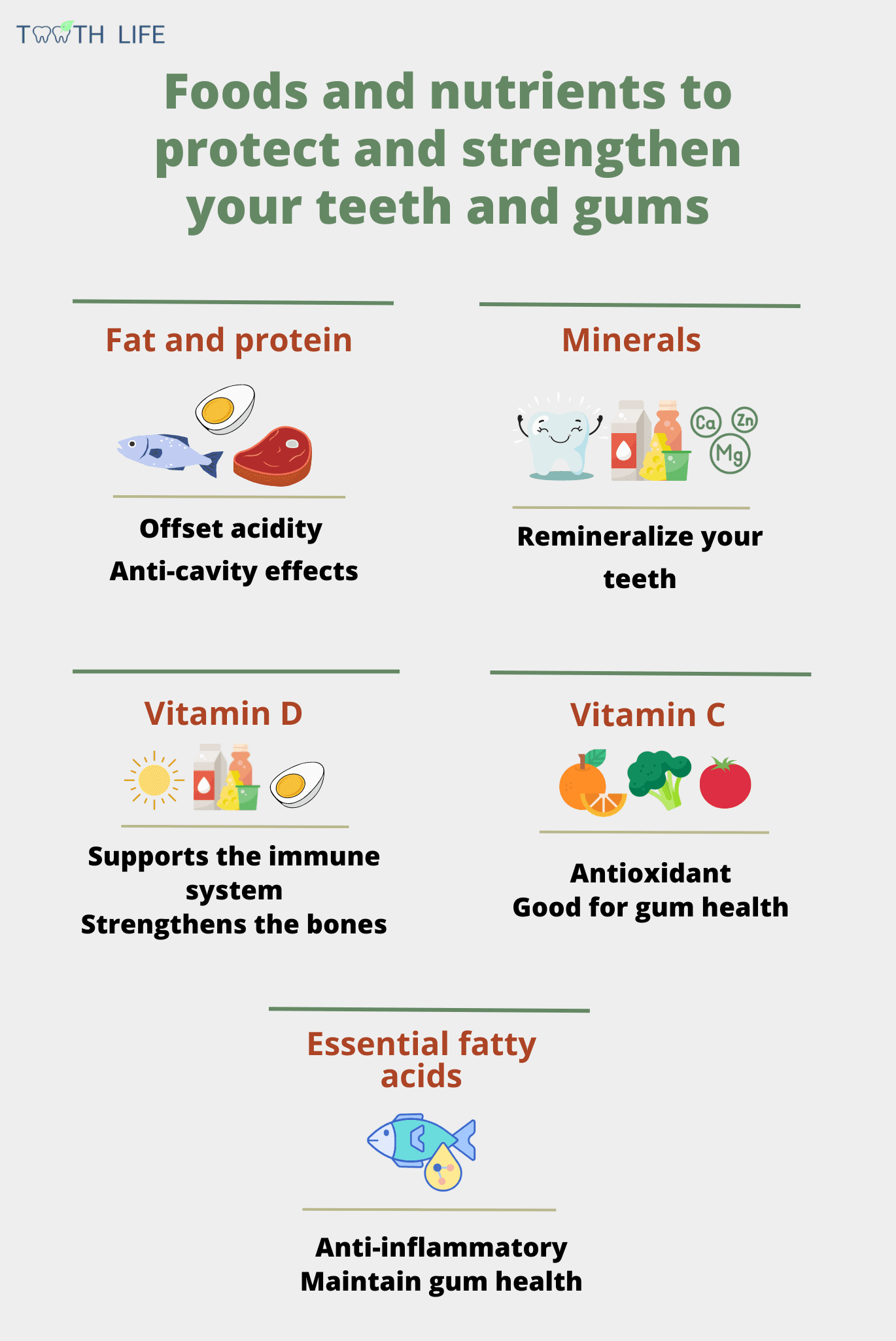 Tooth sensitivity happens when your teeth become sensitive to simple, everyday things like eating, drinking, or even breathing in cold air through your mouth.
Tooth sensitivity happens when your teeth become sensitive to simple, everyday things like eating, drinking, or even breathing in cold air through your mouth.
This is something you should never ignore. Sensitivity often means that something is actively damaging your teeth or irritating the nerves inside them. The top priority is to identify and treat the root cause as soon as possible.
We all know how important consistent oral hygiene is for preventing these problems — but what about your diet and nutrition? They’re often overlooked, yet just as important.
In this article, we’ll focus on how poor nutrition and vitamin deficiencies can contribute to two common problems: tooth sensitivity and cavities.
In this article...
1. How Do Teeth Become Sensitive?
2. Nutrients That Protect You From Tooth Sensitivity
3. Healthy Nutrition Is Key to a Healthy Saliva Flow
4. How Is Our Modern Diet Affecting Our Teeth?
5. Takeaway:
How Do Teeth Become Sensitive?
Teeth become sensitive when their hard outer layers start to wear down, leaving the inner nerves vulnerable.Once those nerves are exposed, your teeth become much more reactive to changes in temperature or pressure. Even simple things like sipping a hot drink or biting into something cold can cause discomfort.
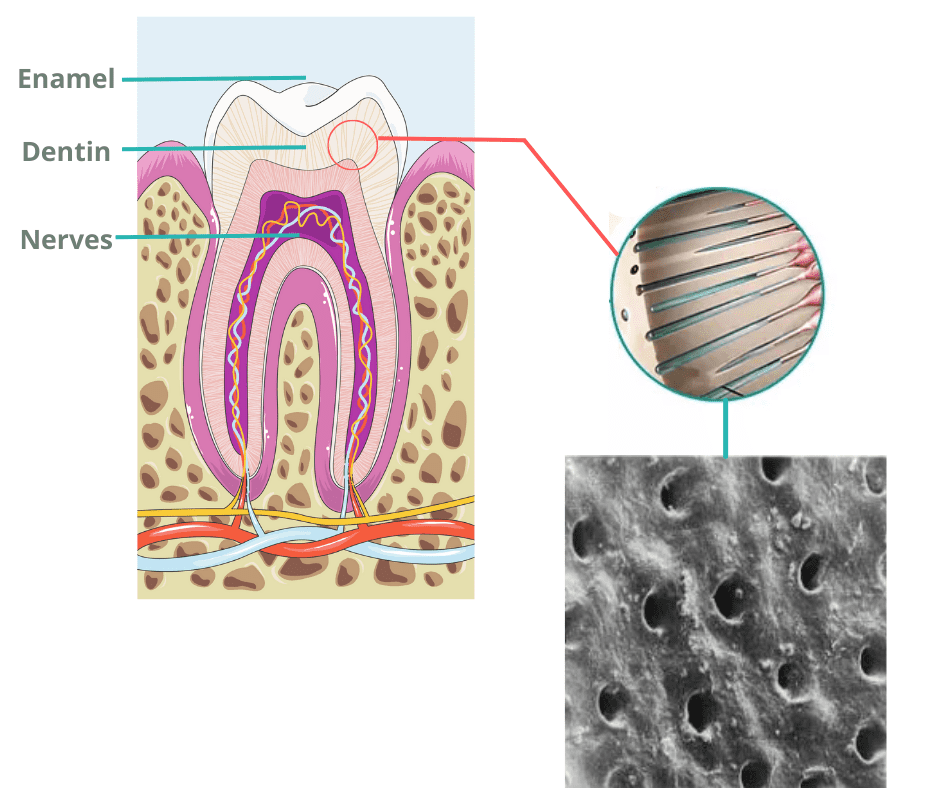
The most common cause of this is tooth decay or cavities. They affect nearly 90% of U.S. adults between the ages of 20 and 64.
Cavities form when certain bacteria in your mouth feed on sugars from your diet and produce acids. Over time, these acids dissolve the protective layers of your teeth and can eventually reach the inner nerves.
But the process behind tooth decay is actually more complex than just bacteria and sugar. It’s the result of dozens of factors working together. To name a few:
- Oral hygiene habits
- Diet and nutrition
- Saliva quality and flow
- Balance of harmful and beneficial bacteria
- Mouth breathing
- Immune system health
- Genetics
In simple terms, cavities form when harmful factors outweigh the protective ones. A healthy, nutrient-rich diet is one of the best defenses you have. It helps your teeth stay strong, mineral-dense, and repair early damage.
Aside from cavities, other dental issues can also lead to sensitivity, including:
- Tooth wear (from grinding or acidic foods)
- Receding gums
- Excessive biting or clenching forces
Before going any further, keep in mind that diet alone can’t cure these problems. If tooth damage has already developed, it needs to be treated by your dentist to prevent it from getting worse.
Nutrients That Protect You From Tooth Sensitivity
What you eat has a direct impact on your teeth and overall oral health.While diet isn’t the only factor, it plays a big role in building stronger teeth that are less likely to develop cavities or sensitivity.
One major reason was their diet, rich in natural, tooth-friendly foods that were low in sugars and high in proteins, fats, fibers, minerals, and vitamins.
Some older studies have suggested that simply improving your diet can significantly reduce the risk of cavities, or even reverse early damage. This mainly involves:
- Cutting down on sugar and refined carbohydrates (like bread, cereals, and processed foods).
- Getting enough protein and healthy fats.
- Boosting mineral intake, especially calcium and phosphorus.
- Increasing fat-soluble vitamins essential for bone and tooth health — particularly vitamins D, A, and K2.
Here’s How It Works
1. Proteins and Fats
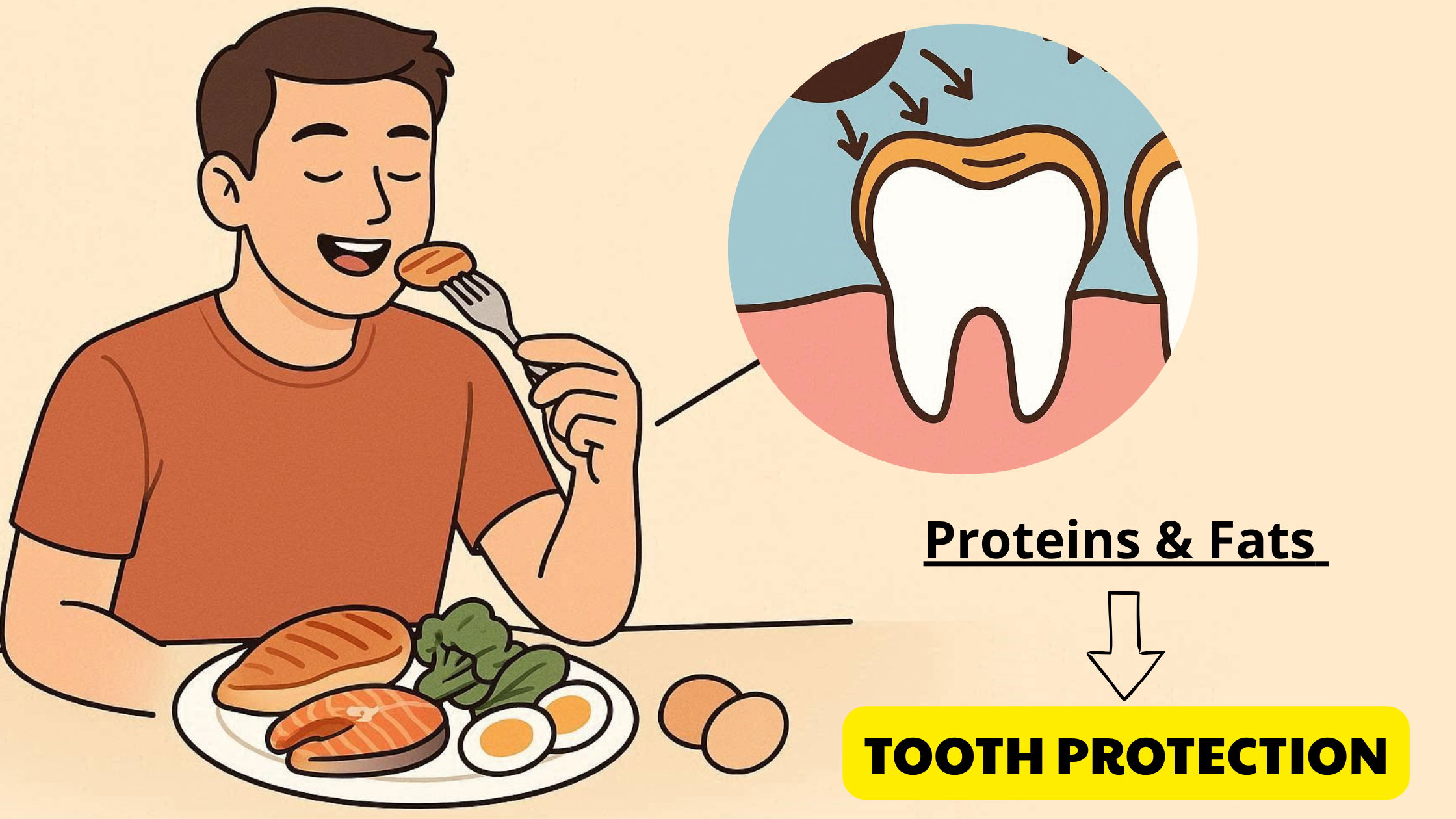
Proteins and fats basically do the opposite of what sugars do to your teeth.
When you chew on food high in proteins and fats, they form a thin protective layer over your enamel, neutralize acids, and make minerals more available for your teeth to use.
To take advantage of this, try to include protein and healthy fats in your meals whenever possible to protect your teeth and offset the harmful effects of sugars and acids.
2. Minerals
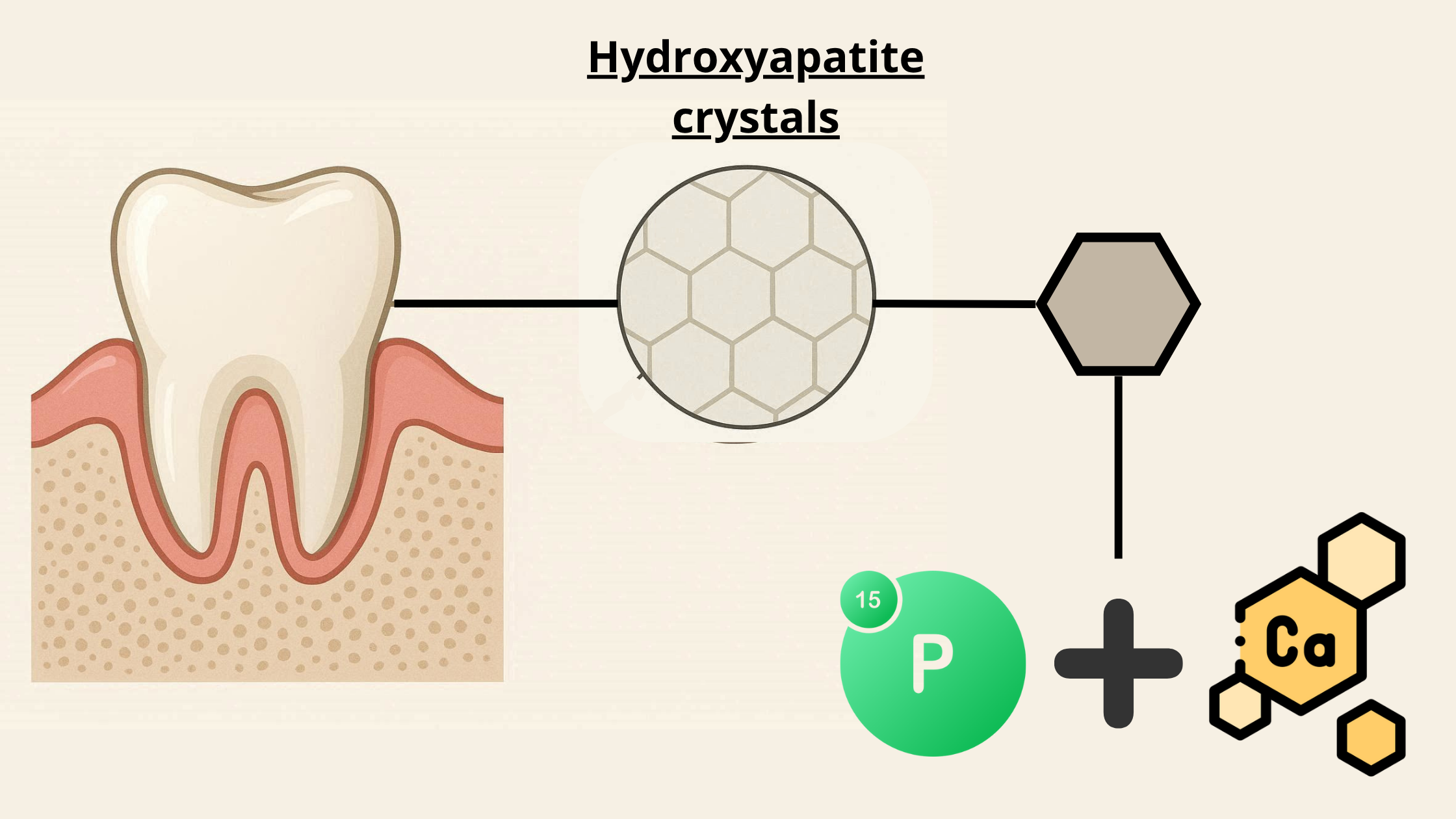
Calcium and phosphorus combine to form hydroxyapatite, the main building block of your teeth and bones.
If your diet lacks these minerals, your teeth lose their ability to repair and maintain themselves, making them weaker and more prone to damage.
3. Vitamins
Vitamins D, K2, and calcium work hand in hand to keep your teeth and bones strong.
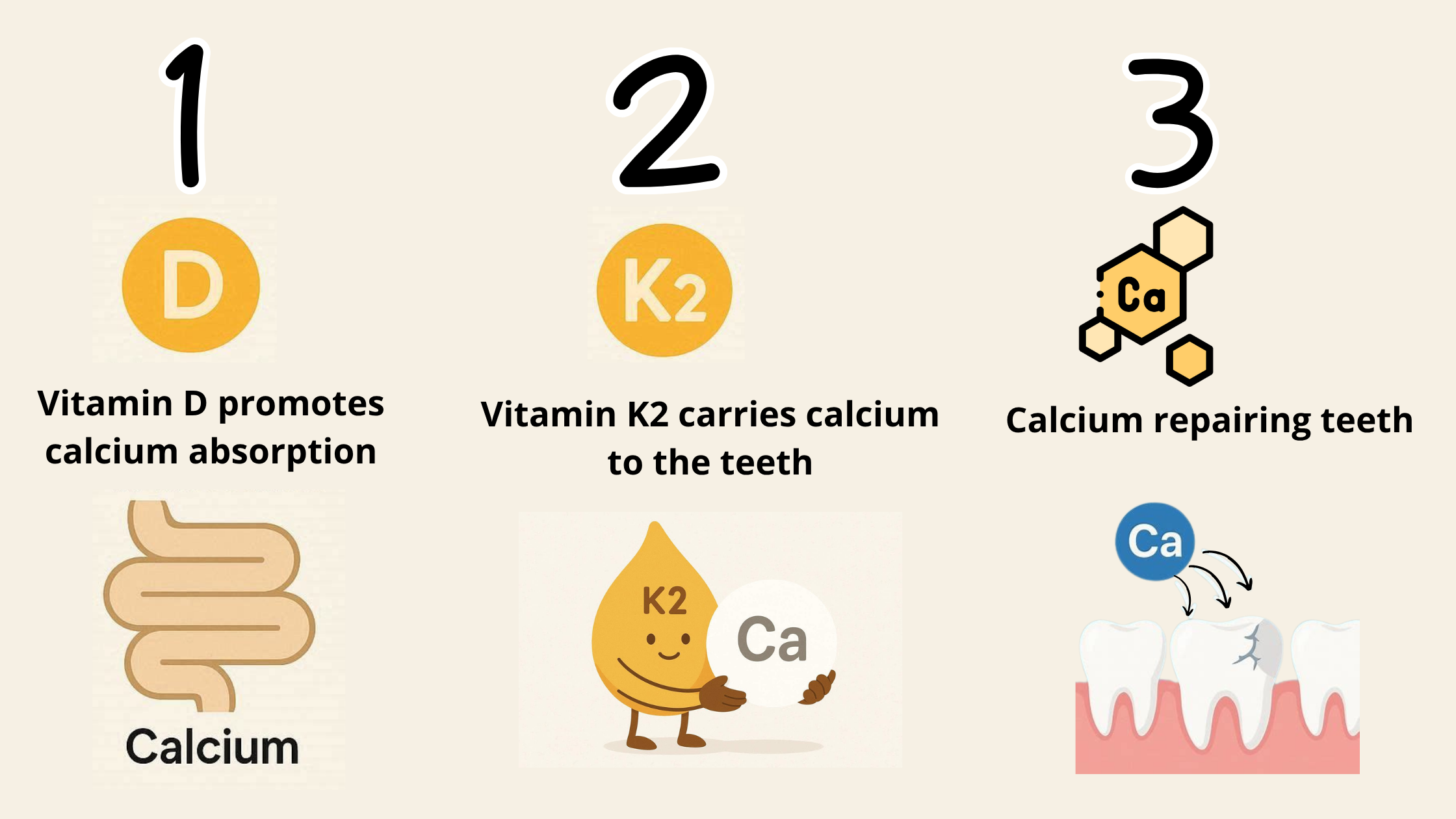
- Vitamin D helps your body absorb calcium from food.
- Vitamin K2 makes sure that calcium goes to the right places, like your teeth, bones, and saliva. A deficiency in K2 can cause the extra calcium to build up in unwanted areas, like arteries, the heart, and other organs.
Interestingly, observations show that some indigenous populations who regularly eat foods rich in vitamin K2 — such as raw dairy, eggs, and organ meats — have almost no cavities.
4. Sugar Alcohols
Aren’t sugars bad for teeth? Not all of them. Sugar alcohols can actually benefit your oral health.
These are the sweeteners that end in “-ol”, like xylitol, sorbitol, and erythritol.
They don’t cause insulin or glucose spikes like regular sugar, and bacteria in your mouth can’t use them to produce acids — meaning they don’t cause cavities.
In fact, xylitol has been shown to slow down the growth of cavity-causing bacteria. That’s why it’s commonly added to chewing gum, toothpaste, mouthwashes, and dental gels designed for cavity prevention.
Healthy Nutrition Is Key to a Healthy Saliva Flow
Saliva contains everything your teeth need— minerals, antibacterial agents, and moisturizers.
It constantly coats and protects your teeth, delivering minerals that replace those lost during acid attacks. It also helps neutralize acids and fight harmful bacteria in your mouth.
So, where does saliva get its tooth-protective benefits? Mainly from the nutrients in your diet.
Once vitamins and minerals are absorbed in your intestines, they go straight to your saliva. Think of it as a nutrient carrier that nourishes and repairs your teeth.
If your diet is high in sugar and processed foods, your saliva becomes less effective. It loses its mineral content, becomes more acidic, and may even harm your teeth.
That’s why, if you want strong, cavity-resistant teeth, you should seriously start thinking about supporting your saliva. Here’s how you can do it:
- Stay hydrated throughout the day to maintain a healthy saliva flow and prevent dry mouth.
- Chew sugar-free gum between meals to stimulate saliva production.
- Eat a balanced, nutrient-rich diet to improve saliva quality.
- Limit sugary foods and drinks, as they feed harmful bacteria and make saliva more acidic.
- Avoid frequent snacking. Saliva does most of its repair work between meals, so constant snacking interferes with this process.
How Is Our Modern Diet Affecting Our Teeth?
Chewing harder, textured foods has a natural self-cleaning effect on teeth and also stimulates saliva production. Soft, easy-to-chew foods, however, don’t help much in this.
Today, most of our diets are based on cooked, soft, processed, and high-carb foods. Not only are these low in nutrients, but they also require minimal chewing.
It's even worse when diets are high in refined sugars and low in protective nutrients like proteins, healthy fats, vitamins, and minerals.
How much diet affects your teeth depends on several factors, including:
Sugar intake per day:
The more often you consume sugar throughout the day, the more frequently your mouth becomes acidic, and the more minerals your teeth lose. For example, eating sugary snacks five times a day is far more damaging than having them once or twice.
The quantity of sugar matters too — adding two tablespoons of sugar to your coffee is worse than just one.
Refined and added sugars (found in processed foods and drinks) are especially harmful compared to natural sugars in fruits and milk. Limiting these not only protects your teeth but also reduces the risk of conditions like diabetes, obesity, and cardiovascular disease.
Food texture:
Foods such as caramel, potato chips, and popcorn stick to your teeth and prolong acid attacks. The longer a food stays on your teeth, the more damage it can cause.
The last food you eat in a meal:
What you finish your meal with has a big impact on mouth acidity afterward. For example, ending a meal with sweet coffee will spike acidity more than finishing with a piece of cheese or sugar-free yogurt. Eating sugary or acidic foods alone is also more harmful than consuming them as part of a meal.
Takeaway:
Tooth sensitivity and cavities are influenced not just by oral hygiene but also by your diet and nutrition.Proteins, healthy fats, minerals, and vitamins strengthen teeth, support saliva, and may even help repair early damage.
Limiting refined sugars, eating nutrient-rich foods, and maintaining a healthy saliva flow are the pillars for strong, cavity-resistant teeth.